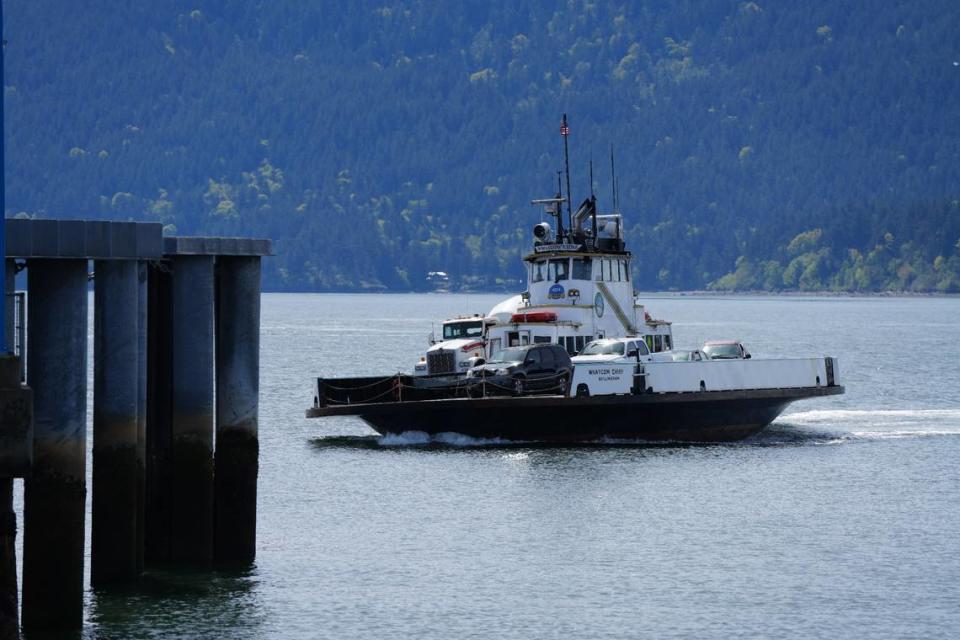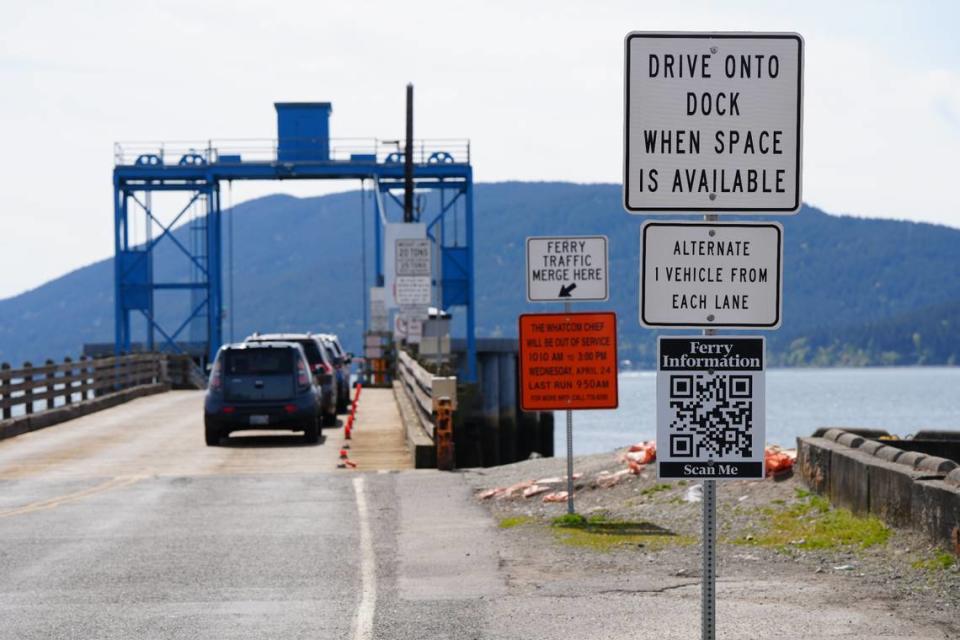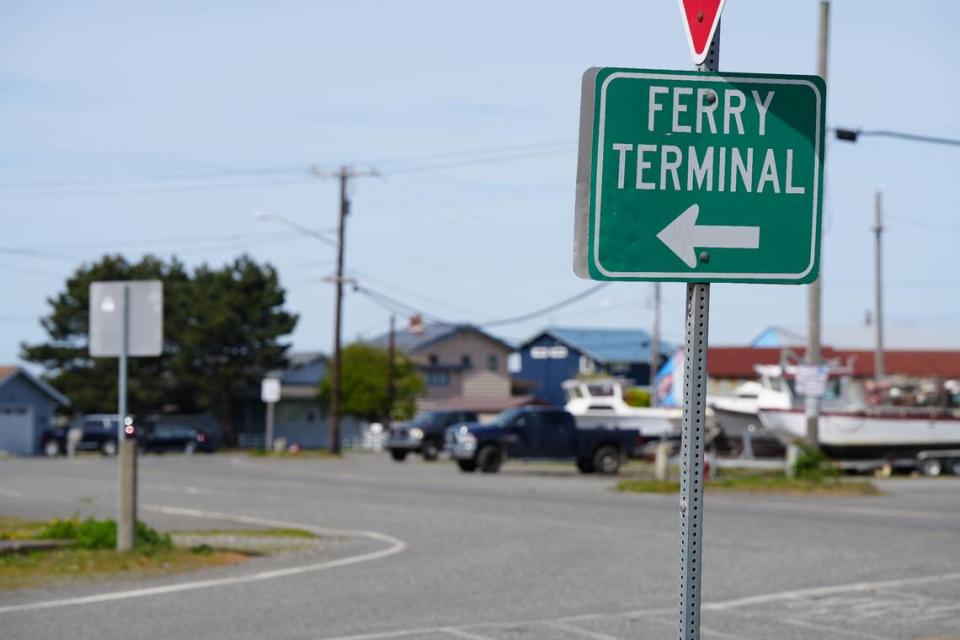Lummi Island resident sues county and executive over ferry rate hike taking effect June 1
A Lummi Island resident is suing Whatcom County Executive Satpal Sidhu, Public Works Department Director Elizabeth Kosa, and Whatcom County over Sidhu’s recent executive order raising ferry rates effective June 1.
In a lawsuit filed April 16 in Whatcom County Superior Court, Peter G. Earle is seeking an injunction to stop the fare increase for the Whatcom Chief, the ferry that carries cars and pedestrians on the 8-minute ride across Hale Passage between Lummi Island and Lummi Nation.
It’s the only access to the mainland for most of the island’s 934 residents, in addition to tourists, Whatcom Medic One ambulances and other service providers.
A hearing is set for 1:30 p.m. Friday.

Earle, who is acting as his own counsel, claims that county officials are incorrectly calculating the costs that they are using to justify the fare increase by illegally including emergency maintenance repairs and tideland lease costs.
Whatcom County’s code requires ferry fare payers to generate sufficient revenue on an annual basis that covers 55% of the ferry’s operating costs, as defined in the county code, and is known as the ferry fare box.
Earle’s lawsuit claims the county has violated the county charter and codes by including nearly $800,000 in emergency repairs and expansions to the Lummi Island ferry’s dolphins as operating costs in the ferry fare box. Dolphins are a group of pilings that can serve as a stabilization or mooring point for a dock, bridge or other waterway structure.
Earle’s lawsuit also claims that the county has violated its own charter since 2011 by including the monthly real estate leasing costs the county pays to the Lummi Nation for the tidelands the Lummi Island ferry system is on as operating costs in the ferry fare box, according to court records.
Earle’s lawsuit alleges that including both the emergency repair and leasing costs as operating costs, rather than as capital costs, is incorrect and illegal, and is the justification for the ferry rate hikes.
“Plaintiff alleges that he, and other ferry fare-payers similarly situated, will suffer imminent pecuniary harm caused by the defendants’ inclusion of unlawful expenses as operating costs in the ferry fare box,’‘ according to the lawsuit.
Earle is seeking a temporary and permanent injunction that stops the ferry fare increases from going into effect. He is also seeking a court order that would prohibit the county from charging anything other than “regular and routine” maintenance as operating costs; that the county violated its code by including the emergency dolphin repair costs of $781,923.77; that the county violated its charter by not including the monthly tideland lease payments in its capital budget and that any costs erroneously included as operating costs since Jan. 1, 2011 be reclassified as capital costs, according to court records.
Earle is asking the court to stop the fare increases from going into effect until the issues surrounding the emergency repairs and monthly lease costs are resolved.
“The chickens are coming home to roost,” Earle said in a Wednesday interview with The Bellingham Herald. “They’re saying we’re changing your fares and you have to pay for all of this padding that we put into the fare box, and that’s why we’re increasing fares. They’re not increasing the fares because we’re failing to cover 55% of the legitimate fare box operating costs as defined by (the county code), they’re charging us increased fares padded with stuff that violates the provisions in (the county code). ... We’re asked to pay the piper now for the misdeeds and misaccounting that has accrued to this point.”
County Council members discussed the lawsuit in a private executive session Tuesday morning but made no announcement.
“We are in receipt of the complaint and will respond through the legal processes available. We do not comment on pending litigation,” Whatcom County spokesman Jed Holmes told The Herald.
Council members discussed the fare rates in a separate committee meeting Tuesday morning, and the proposed fare hike was approved unanimously Tuesday night after a public hearing.
Repairs
The dolphins at the center of Earle’s lawsuit, which are on the Lummi Island side dock, were built in 1978 and were scheduled for replacement in 2018 after the structures had reached the end of their service life. Rather than replacing the dolphins in 2018, the county’s Public Works Department rebuilt them in an attempt to extend their service life until 2024, with the expectation that they would be replaced within the following two to five years, according to Earle’s lawsuit.
The repairs included adding steel and timber piles to the structures, and were listed as capital expenditures. Additional repairs were made in June 2022 after a Washington State Department of Transportation Bridge Preservation Dive Team conducted an inspection in 2021 and found several piles were broken or rotten. The 2022 repairs added additional steel and wooden piles to the dolphins, strengthening and expanding their capacity, and extending their service life, court documents state.
The Public Works Department then added the nearly $800,000 in repair costs to the ferry fare box account, listing them as “’actual regular and routine maintenance’ expenditures in arbitrary and capricious disregard of the definition of ‘operating cost’ contained” in the Whatcom County code, according to the lawsuit.
“The work performed pursuant to this reconstruction did not simply repair or replace existing components of the dolphin, rather it constituted a substantial rebuild with a new design and different stronger material,” court documents state.
Including the nearly $800,000 repairs to the dolphins in the ferry fare box would mean that $430,058 is the 55% that would need to be covered by the ferry fare payers, the records state.
Earle’s lawsuit alleges that multiple county officials, including the executive, the public works director and Holmes, the county spokesperson, all acknowledged that the repairs to the dolphins were emergency repairs that were unanticipated, unexpected and expensive. In a September letter Holmes prepared for Sidhu regarding the Lummi Island dolphin repairs, Holmes concluded that it would be difficult to support the Public Works Department’s conclusion that the repairs should be classified as operating costs, as opposed to capital expenditures, court documents show.
In late October, Sidhu sent an email to more than a dozen Lummi Island residents regarding appointments to the Whatcom County Ferry Advisory Committee. In the email, Sidhu told the residents that “it is prudent to address how out-of-the-ordinary or unanticipated or unplanned repair costs impact the ferry fare box. The goal is to ensure ferry rates are regular, routine, and predictable,” the court records state.
Sidhu’s email went on to state that the county council would have to address the code language impacting the ferry fares, but that the recommendation from his administration would be to address unanticipated or unplanned repairs and explore separate revenue sources to cover them, according to court records.
Earle’s lawsuit alleges that the expenditures for the emergency repairs are out of the ordinary and well above the next largest non-dolphin related amounts charged as regular and routine maintenance to the ferry fare box for the past 10 years.
“The two disputed dolphin charges in 2022 and 2023 are so aberrant in comparison to all other operational maintenance expenses over the course of the last decade that they represent, respectively, more than an 11,000% and 15,000% increase over the average charged expense of $2,533.00 for all other ‘regular and routine maintenance’ costs during that ten year time period,” the lawsuit states.
The council ultimately adopted a resolution in mid-March that directed the executive to issue an executive order increasing Lummi Island ferry fares due to a projected budget deficit of more than $400,000.
However, Earle’s lawsuit claims that the deficit has been incorrectly calculated, because it includes the emergency dolphin repairs and reconstruction costs as operating costs, rather than capital costs.
“The inclusion of the $781,923.77 dolphin expenditures ... as operating costs has distorted the calculation of the percentage of total revenue generated through ferry user fees in comparison to total actual operating costs for 2022 and 2023 and by virtue of the fare increase imposed by (the executive’s order), which requires ferry fare payers to reimburse the county for extraordinarily large unanticipated expenses that are not within the meaning of ‘actual regular and routine maintenance’ as required by (the county’s code),” the lawsuit states.

Tidelands lease
In addition to incorrectly including the dolphin repairs as operating costs in the ferry fare box, Earle’s lawsuit alleges the county has illegally included millions of dollars in tideland lease payments as operating expenses going back to 2011. Those expenses, Earle’s lawsuit contends, should be included in the county’s capital budget instead.
The county entered into a 35-year lease with the Lummi Nation in late October 2011 for use of Lummi Reservation tidelands, which the Gooseberry Point dock for the Lummi Island ferry sits on, according to the lawsuit.
Per the lease agreement, Whatcom County is required to pay $200,000 per year adjusted for the consumer price index to Lummi Nation for use of the tidelands, which the county makes in monthly payments.
From Jan. 1, 2011 through Dec. 31, 2022, the Public Works Department included the monthly lease payments adjusted for CPI in the ferry fare box as regular and routine administrative and operating expenses totaling $2,695,943.72, of which the 55% to be paid by ferry fare payers is listed as $1,482,769.05, according to court records.
Whatcom County’s charter section on illegal contracts states that “real property shall not be leased to the County for more than one year, unless it is included in a capital budget appropriation ordinance,” according to the charter and lawsuit.
By including the monthly lease payments as operating costs, the county “has distorted the calculation of the percentage of total revenue generated through ferry user fees in comparison to total actual operating costs since January 1, 2011 and will continue to do so into the future by virtue of the fare increase imposed by (the executive order),” the lawsuit states.
The executive order increasing ferry rates “will increase the actual amount ferry fare payers pay in order to reimburse the county for the extraordinarily large and explicitly unlawful expenses that are prohibited” by the county’s charter “unless said lease payments are retroactively included in a capital budget appropriation ordinance,” court documents state.
Fair treatment
In his interview with The Herald, Earle said he and other island residents weren’t disputing the need for regular users of the Lummi Island ferry system to pay 55% of operating costs, but said the county should follow the clearly defined codes and definitions for how those costs should be calculated.
Earle said the county amended its ferry fee code in 2005, in part to provide better definitions and clarity as to how the payment scheme operated, with a goal of providing fair, reasonable and predictable ferry fees.
“The public policy concerns behind that is that access to the mainland and state and county road systems for people who live on the island shouldn’t be predicated on socioeconomic status so that only those who can afford it can live here,” Earle said, alleging that “some practices by public works over the past year have been an attempt to gentrify the island by ordinance.”
Earle said that people who can’t afford the fare increases, which have occurred in 2015 and 2011, are then forced to move. He said he has seen a loss of young families and families with kids following past fare rate hikes.
“The island community prides itself on being a diverse community .... We have local artists, young people who love the beauty of the island and lifelong residents of this place,” Earle said. “So when you have a structure of law that’s intended to have sustainable, predictable, fair fares, the county ought to abide by that.”
Earle said he hopes to get a preliminary hearing on the injunction in a timely fashion so that island residents can ask the court to preserve the status quo, and temporarily stop the ferry rate increases from going into effect June 1, while the court decides the merits of the lawsuit.
“I’m hopeful that we’ll win. If I didn’t have some degree of reasonable confidence that it is a meritorious lawsuit, I wouldn’t have filed it,” Earle said.
Earle is a semi-retired lawyer who is licensed to practice in Wisconsin and has done work in California, Rhode Island and Illinois. He gave a presentation to the Bellingham City Club in 2018 about his work on the Wisconsin gerrymandering case. He was also involved in the California case requiring paint makers to fund a remediation program to remove lead paint from hundreds of thousands of homes.
“Lummi Island is a valued, beautiful, wonderful part of Whatcom County,” Earle said. “The roads of Lummi Island are connected to the roads of Whatcom County by the ferry. We pay 55% of that, and we don’t dispute that. We don’t think it’s fair for extraordinary costs that violate law to be put on our backs, and those costs, if legitimate should be spread across the entire county or state. The whole county benefits by having Lummi Island as part of the county. ... That’s all we want, to be treated fairly as legitimate members of the Whatcom County community.”

Council action, fare changes
According to Sidhu’s executive order, dated March 28 and updated April 1, there were errors in a 2022 analysis of the code concerning fare box revenue needs and calculations, and “confusion in the calculation extending back to 2006.” The analysis “highlighted the need for greater clarity in the definitions and calculations used to determine ferry rates” and led to a rewrite of code sections regarding fare calculation methods.
Current ferry rates start at $8 for a round trip for a car passenger, or someone on foot or a bike, rising to $33 for a driver and the average car or light-duty truck. Heavier trucks and RVs cost more.
The fare changes include a $1 increase in the cost of a regular vehicle and driver ticket, a reduction of discounts offered through the multi-ride punch cards, and a 30% increase in fares for heavy vehicles.
The Whatcom Chief was built in 1962 and can carry 100 passengers and 20 cars. Ridership in 2023 was 178,183 passengers, according to Whatcom County data.
A replacement ferry is planned and has received $35 million in state and federal grant funding.


